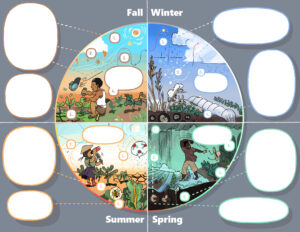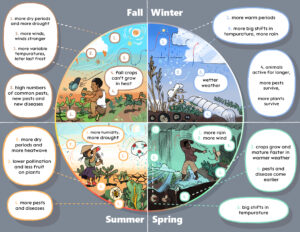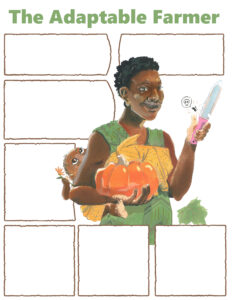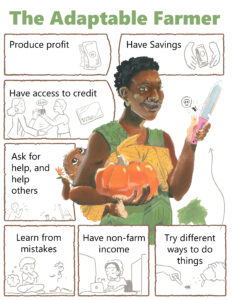Progress report for LNC21-446
Project Information
Farmers across the North Central region are already experiencing production, marketing, and management challenges due to climate change. In Kansas City, yields and weather have become less predictable, pests and diseases have become more prevalent, and farm business management and planning have thus become more challenging.
Cultivate KC is dedicated to ensuring that growers have the skills and access to resources needed to start and maintain sustainable farm businesses. Climate change is a threat to farm businesses and the food industry, as well as to society at large. We need to start educating our farmers to be prepared, adaptive, and resilient with the coming changes to our environment. While some resources on climate change effects and adaptations are available, much of this information is overly complex and inaccessible to non-native English speakers.
Cultivate KC is seeking funding for three years to educate and train current and graduate refugee farmers in our farm business incubation program, New Roots for Refugees, on climate resilience and adaptation to weather extremes, season extension practices, improved sustainable pest, weed and irrigation management. We will use a combination of classroom teaching, in-field demonstrations, and hands-on training. In addition to educational components, we will help farmers develop individual resilience plans and provide participants with access to free or low-cost materials (shade cloth, trap crop seeds and sprays, mulches, etc.). Graduates of the refugee training program will also be invited to participate in the training and resource sharing. Over three years, farmers will implement climate adaptation and season extension strategies, increasing the profitability and sustainability of their farms.
In order to ensure that trainings and education are as effective as possible, we will work with a local Adult Education professor to develop assessment tools. Educational materials will be developed jointly by experienced educators and professionals and program staff. For the first time in the history of the program, we will begin a Farmer Leadership Team that will support the development of the assessment tools, educational materials, supply ordering, and overall program development. As a part of this project, the team will create SOPs for integrating “Farmer Leadership Teams” that will be shared with other similar and interested programs.
- Increase the sustainability, self-sufficiency, and profitability of refugee farmers.
- Increase participants’ knowledge of the effects of climate change, season extension techniques, and improved pest, weed and irrigation management.
- Farmers implement newly-learned strategies in their farming practices.
- Farmers use low-cost or shared supplies with technical assistance from staff.
- Farmers improve their local ecosystem through use of more environmentally sustainable pest and weed management practices.
- After three years, farmers experience extended growing season, thus increasing their overall sales.
- Farmers are better prepared to protect crops from extreme weather effects.
In partnership with Catholic Charities of Northeast Kansas, we operate New Roots for Refugees, a training and farm business incubation program that works with refugees who have agricultural experience. New Roots families take classes and lease incubator plots of land for four years. During this time, they have access to shared farm resources such as tools, tractors, a wash and pack area, greenhouse and cooler space, as well as aggregated market channels. Participants learn the skills to farm successfully in our climate through a combination of lectures, in-field demonstrations, hands-on workshops, and trial-and-error. Business skills, including marketing, bookkeeping and long-term planning, are also offered.
Most of our farmers grow a variety of mixed vegetables and cut flowers. They sell and distribute their produce through several channels including a collective Community Supported Agriculture (CSA) & wholesale model, farmers markets, participation in nutrition incentive programs, and donations.
Program participants reflect our country’s refugee policies and global politics and have, over the years, included people from Somalia, Burundi, Myanmar, Nepal, the Democratic Republic of the Congo, and others. In 2021, our primary group is Burmese from 7 different ethnic groups; we also have 2 Congolese families and one Burundian family.
Although farmers are enrolled in English language classes throughout the program, several strategies are employed by project staff to strengthen communication. All classes are taught with interpretation. For our current cohort, this requires translation into four languages: Chin, Karenni, Burmese and Swahili. All project staff are provided with Plain Language training. This is a style of teaching and creating written materials that relies heavily on the use of pictures and simple words, and the goal is that the reader gains comprehension upon the first read-through. Farmers market managers who operate markets where our participants frequently sell are also provided this training and additional training on how to interact with farmers using an interpreter.
Our program offers graduate support services, that include advanced curriculum (writing business plans, long-term care of fruit trees, and food safety plans) and assistance navigating real world challenges, like negotiating leases for farmland, applying for high tunnel grants through the Environmental Quality Incentives Program (EQIP) offered by the Natural Resources Conservation Service (NRCS) and responding to zoning code requirements in the various municipalities that make up the greater Kansas City area.
As of 2020, the program has graduated 36 farm families. Over 80% of these farm families are still actively farming and 75% are still selling. The average size of a graduate farm is about half an acre, and all farms are located within 18-miles of Juniper Gardens Training Farm; all within the Kansas City metropolitan area. Juniper Gardens serves as a connecting point and hub for graduate farmers. Graduates are still connected to the program and farm site through activities such as: leasing plots at Juniper Gardens Training Farm (3 graduates per year), participating in bulk orders (for fertilizer, straw, soil mix, seed potato, etc.), selling into our aggregated CSA, or simply meeting with staff for technical assistance and/or guidance.
May 2024 Update
As of 2023, the program has graduated 46 farm families and 31 are still farming in our area. Graduates are still averaging about a half an acre of land, but our team recognizes that land access has become a greater barrier to continuing to farm. We are allowing more grads to lease land at our training farm while they search for a suitable land lease or purchase. This has impacted, in small ways, how we deliver our program. Graduates who are on farm are often more integrated in classes and one-on-one TA than grads who are off-farm. We are also mindful of how supplies, particularly ones associated with building in climate resilience, are distributed to ensure fairness for grads on vs. off-farm.
Cooperators
- - Technical Advisor
- - Technical Advisor
- - Technical Advisor
Research
Education
This project relies on varied educational approaches to ensure that farmers gain the knowledge they want/need AND have the ability to implement recommended practices. The primary approaches used are: group education/workshops, on-farm demonstrations, field trips to sites that model practices, and one-on-one technical assistance (referred to as "field walks"). Because we work with non-native English speakers - all education is offered with interpretation and occasionally translated materials. All materials and trainings are offered with using plain language principles and heavy use of graphics, visuals, and demonstrations. This project relies both on our existing skilled-staff, and outside experts who can help us improve specific aspects of the program and education. Throughout this grant project - we are relying on Dr. Royce Ann Collins, Adult Education PhD, to help staff improve their teaching and evaluation skills. Others are helping us with specific topics, such as Laura Lengnick and Mark Gawron.
May 2024 Report
Since our last report, Mark Gawron has rejoined the Cultivate KC team and is no longer able to assist as an independent contractor. We are still in the process of identifying external support, and this has delayed some of the delivery of our classes.
Project Activities
Educational & Outreach Activities
Participation Summary:
Learning Outcomes
- Climate Resilience
- Adult Education
- Cover Cropping
- Silage Tarp
- Season Extension
- Integrated Pest Management
- Pollinator Plants/Attracting Beneficials
Project Outcomes
Silage Tarp
Cover Cropping
Pollinator Plantings
Integrated Pest Management/Organic Pest Management
Climate Resilience Planning
Reduced/Low-Till
A very hard-working and enthusiastic 3rd year farmer in the New Roots program had a somewhat rough season during 2022. Several things changed in her personal life - she welcomed a new baby, and her husband took on a new job where he was traveling quite a bit. Because of this, she simply didn't have the support that she needed to maintain her farm plot. I can't think of anyone who the knowledge, training and resources around cover cropping and silage tarping benefited more. She was able to manage weeds quickly and efficiently, and keep them out by planting cover crops. Despite the hardships she faced last year, her farm plot is ready to go for the 2023 growing season!
A note from Laura Lengnick:
"Dear Semra, I’m writing to thank you for inviting me into your Plain Language project as the climate resilience lead. At this point in the project and after delivering the climate resilience lesson on February 21st, I took some time to reflect on my most important lessons learned in our work together. When I joined the project, I looked forward to working with the project team to learn a new skill – plain language teaching – and perhaps to deepen my understanding of agricultural climate resilience through a new application of the concepts tailored to meet the needs of immigrant growers. Looking back on my experience, I am awestruck by the comprehensive impact this work has had, and I expect will continue to have, on all my other teaching and writing. As I gained experience using plain language, I found plain language creeping into all of the my work and making it better, more engaging to a wide range of audiences, and more satisfying for me to teach. Based on this experience, I wonder if it would be possible to add plain language training to all agricultural degree programs? I believe it would greatly improve understanding and appreciation for the work of agricultural educators, technical assistance specialists and researchers across a diversity of audiences. Best, Laura"
While it has been really great to collaborate with many different partners on the execution of this grant - it has also made it quite challenging to manage all of the moving parts and people - especially if things change and folks pull out of their commitments. This isn't necessary a fault of SARE or the grant, but perhaps just a lesson for the grant writer (myself and future grant writers). Collaborations are so helpful and important, but I think the recognition of focusing on a set number of partners is really important. With this particular grant, I may have bitten off a little more than I can chew.
May 2024 Update
This report echos the sentiments shared above. I think in the future, we would structure the program to develop most of the curriculum in the first year of the grant and then prepare staff to teach the lessons the second and third year. So many of our partners have changed from the beginning that a higher burden has been placed on staff, and they are often busy with other TA and instruction most of the year.



